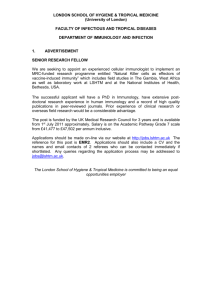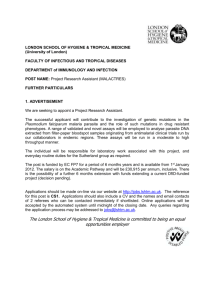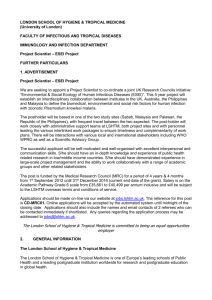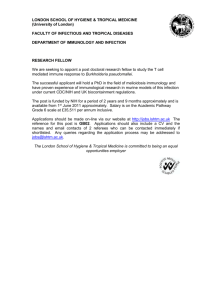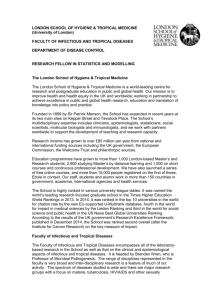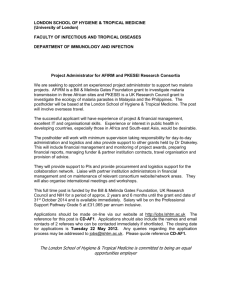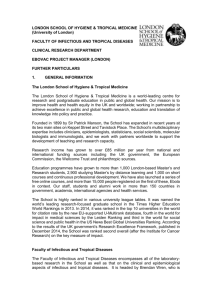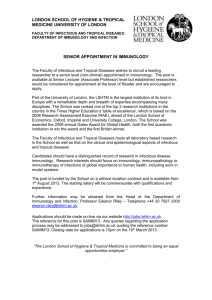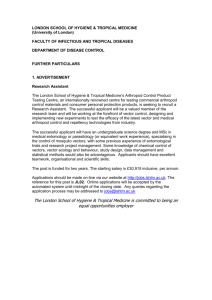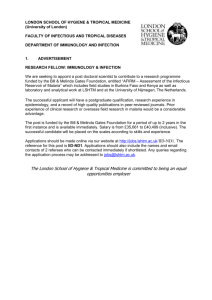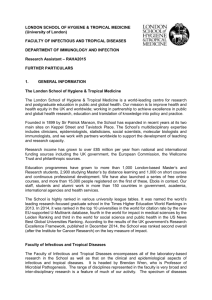Faculty of Infectious and Tropical Diseases :The
advertisement
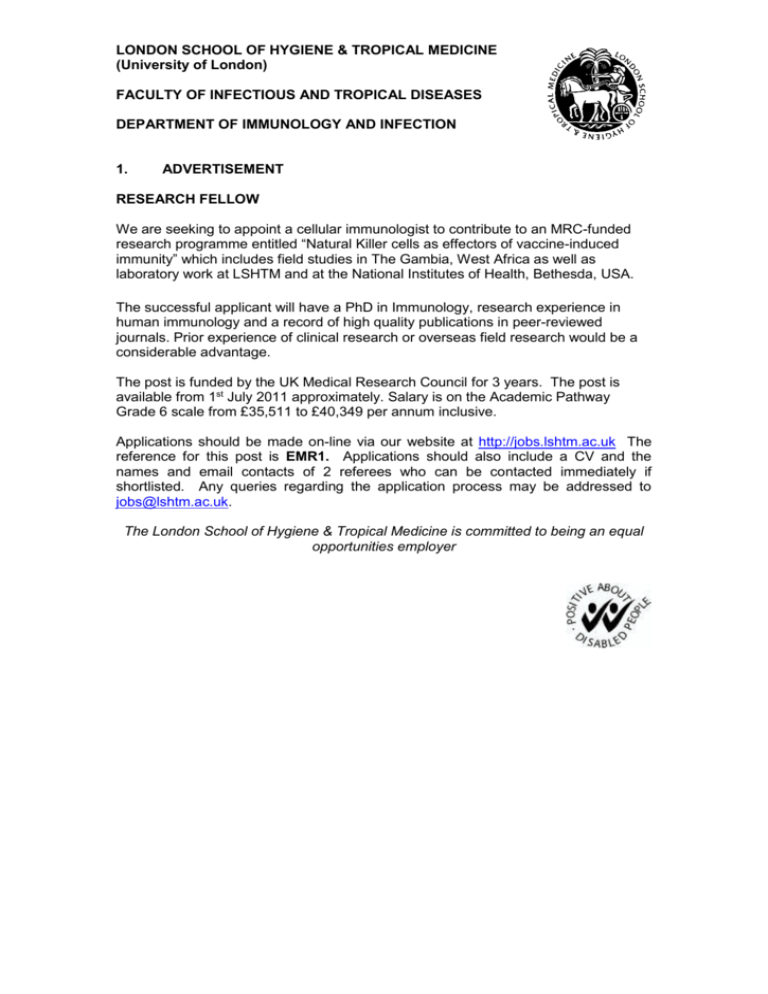
LONDON SCHOOL OF HYGIENE & TROPICAL MEDICINE (University of London) FACULTY OF INFECTIOUS AND TROPICAL DISEASES DEPARTMENT OF IMMUNOLOGY AND INFECTION 1. ADVERTISEMENT RESEARCH FELLOW We are seeking to appoint a cellular immunologist to contribute to an MRC-funded research programme entitled “Natural Killer cells as effectors of vaccine-induced immunity” which includes field studies in The Gambia, West Africa as well as laboratory work at LSHTM and at the National Institutes of Health, Bethesda, USA. The successful applicant will have a PhD in Immunology, research experience in human immunology and a record of high quality publications in peer-reviewed journals. Prior experience of clinical research or overseas field research would be a considerable advantage. The post is funded by the UK Medical Research Council for 3 years. The post is available from 1st July 2011 approximately. Salary is on the Academic Pathway Grade 6 scale from £35,511 to £40,349 per annum inclusive. Applications should be made on-line via our website at http://jobs.lshtm.ac.uk The reference for this post is EMR1. Applications should also include a CV and the names and email contacts of 2 referees who can be contacted immediately if shortlisted. Any queries regarding the application process may be addressed to jobs@lshtm.ac.uk. The London School of Hygiene & Tropical Medicine is committed to being an equal opportunities employer 2. GENERAL INFORMATION The London School of Hygiene & Tropical Medicine The London School of Hygiene & Tropical Medicine is one of Europe’s leading Schools of Public Health and a leading postgraduate institution worldwide for research and postgraduate education in global health. Part of the University of London, the London School is the largest institution of its kind in Europe with a remarkable depth and breadth of expertise encompassing many disciplines. The School was ranked one of the top 3 research institutions in the country in the Times Higher Education’s 'table of excellence', which is based on the 2008 Research Assessment Exercise (RAE), ahead of the London School of Economics, Oxford, Imperial and University College, London. The institution also achieved the largest increase in ranking compared with 2001, of any of the top 10 institutions in the RAE rankings. In 2009, the School became the first UK institution to win the Gates Award for Global Health. The School’s environment is a rich multicultural one: there are almost 4000 students from 100+ countries following 22 taught masters courses delivered either in London (~650) or through distance learning (~2700), and undertaking research degree training (~400). Over 40% of these students are from non-European countries. The largest growth has been in distance learning students (>40% over 3 years), though the London-based student population (where accommodation limits growth) is at its highest level ever. Alumni are working in more than 180 countries. The School has about 1400 staff drawn from over 60 nationalities. There are research collaborations with over 100 countries throughout the world, utilizing our critical mass of multidisciplinary expertise which includes clinicians, epidemiologists, statisticians, social scientists, molecular biologists, immunologists, ophthalmologists, anthropologists, virologists, pharmacologists and nutritionists. At any one time around 100 School staff are based overseas, particularly in Africa and Asia. We have a strong commitment to partnership with institutions in low and middle income countries to support the development of teaching and research capacity. The School has expanded greatly in recent years. Its research funding now exceeds m£62.4 per annum, much of it from highly competitive national and international sources. The commitment of staff to methodological rigour, innovative thinking and policy relevance will ensure that the School continues to occupy a leadership position in national and global health, adapting quickly to new challenges and opportunities. Mission The School's mission is to contribute to the improvement of health worldwide through the pursuit of excellence in research, postgraduate teaching and advanced training in national and international public health and tropical medicine, and through informing policy and practice in these areas." Faculty of Infectious and Tropical Diseases :The Faculty of Infectious and Tropical Diseases encompasses all of the laboratory-based research in the School as well as that on the clinical and epidemiological aspects of infectious and tropical diseases. It is headed by Simon Croft, who is Professor of Parasitology. The range of disciplines represented in the faculty is very broad and inter-disciplinary research is a feature of much of our activity. The spectrum of diseases studied is wide and there are major research groups with a focus on malaria, tuberculosis, HIV/AIDS and other sexually transmitted diseases, vaccine development and evaluation, and vector biology and disease control. The Faculty is organised into four large research departments comprising: Pathogen Molecular Biology, Immunology and Infection, Disease Control, and Clinical Research. There is close interaction between scientists in different research teams. The Faculty has strong overseas links, which provide a basis for field studies and international collaborations in developed and developing countries. The teaching programme includes MSc courses, taught in- house and by distance learning, which are modular in structure, a variety of shortcourses and an active doctoral programme (PhD and DrPH). Department of Immunology and Infection (Head: Professor Eleanor Riley) Research in the Department of Immunology and Infection centres on analysis of the host response to infection at the molecular, cellular and population levels. The goals are to develop a greater understanding of basic mechanisms of immunological protection versus pathology, and to apply this knowledge to the development of immunological interventions and the identification of correlates of immune status. Our work involves application of state-of-the-art cellular and molecular approaches to the in vitro analysis of pathogen-host cell interactions, to in vivo studies in models and to the study of immunity at the population level in disease endemic areas. Current research includes the role of innate and adaptive responses in resistance to the bacterial pathogens, Mycobacterium tuberculosis and Burkholderia pseudomallei (G. Bancroft); correlates of protection against tuberculosis and studies of BCG vaccination, human CD8+ T-cell responses to mycobacterial antigens and synthetic peptides, use of whole blood assays in immuno-epidemiology (H. Dockrell); innate and adaptive immunity to malaria including activation of natural killer cells, cytokine regulation in clinical immunity and immunopathology (E. Riley, K. Couper and J. Hafalla); using anti-malarial antibodies as a marker of malaria exposure & assessment of the use of sero-epidemiology to monitor and target malaria control measures (C. Drakeley), transmission of Plasmodium falciparum malaria including antibody responses to gametocyte-infected erythrocyte surface antigens, effect of gamete antigen variability on transmission, gametocyte sequestration and development and gametocyticidal drug therapy (C. Sutherland and T, Bousema); impact of concomitant viral, bacterial, protozoal and helminth infections on induction of immune responses and immunopathology and T cell regulation and induction of mucosal immune responses during intestinal nematode infections (H. Helmby); the identification and evaluation of novel drugs and drug delivery systems for schistosomiasis, leishmaniasis, trypanosomiasis and malaria (Q, Bickle, S. Croft, K. Seifert, V. Yardley); intracellular trafficking and secretory pathways of cells of the immune system (T. Ward); innate and adaptive immunity to leishmaniasis (P. Kropf and M. Rogers). Department of Pathogen Molecular Biology (Head: Professor John Kelly) Research in the Department of Pathogen Molecular Biology focuses on the molecular biology and genetics of pathogens and their hosts in the context of improving the understanding and control of infectious diseases. Aspects of pathogen biology of interest include: (i) determining the mechanisms of infection of globally important viral, bacterial and parasitic pathogens; (ii) deciphering the genetic diversity of selected disease agents in natural populations and to determine its epidemiological impact, (iii) studying immune evasion mechanisms of particular disease agents, (iv) exploiting parasitic, bacterial and viral pathogens as model biological systems and (v) developing practical applications including improved diagnostic tests and the identification and characterisation of vaccine candidates and drug targets. PMBD currently has funding to investigate, amongst others, the malaria parasite (Plasmodium spp), Chagas disease (Trypanosoma cruzi), African sleeping sickness (Trypanosoma brucei), amoebic dysentery (Entamoeba), the Leishmania species, bacterial food borne pathogens (Campylobacter jejuni and Yersinia enterocolitica), gastric ulcers/cancer (Helicobacter pylori), pseudomembranous colitis (Clostridium difficile), plague (Yersinia pestis), paddy field melioidosis (Burkholderia pseudomallei), Tuberculosis (Mycobacterium tuberculosis), Pneumonia (Streptococcus pneumoniae), Bluetongue viral disease of livestock, Herpesviridae, SARS, the hemorrhagic fever virus (RVFV) and the enteric rotavirus that cause significant diarrhoeal disease in infants developing countries. Department of Clinical Research (Head: Professor Alison Grant) The Department of Clinical Research addresses infectious diseases of major public health importance in developing countries. Activities include trials of new therapies, vaccines and educational interventions; the development of new diagnostic tests; studies to elucidate the immunological and molecular correlates of pathogenesis and protective immunity, and to identify genetic polymorphisms conferring protection or susceptibility to infectious diseases; health services research which aims to identify the most efficient and cost-effective way to deliver health care; and health policy analysis. In addition to our many overseas collaborations, we have close links with the Hospital for Tropical Diseases, in new, purpose-built accommodation on the main UCL Hospital campus, five minutes walk from the School. The Wellcome Trust Bloomsbury Centre for Clinical Tropical Medicine is based in the Department, and currently supports five Clinical Training Fellows and two Career Development Fellows, most of whom are based overseas. Much of the Department’s research concerns HIV and related infections; in particular, the interaction between HIV infection and other sexually transmitted diseases, and between HIV infection and tuberculosis. We have longstanding and fruitful collaborations addressing these issues in Tanzania, Zambia, Uganda and South Africa. Brian Greenwood FRS is leading an initiative to strengthen malaria research in the School through new collaborative links in Africa. Department of Disease Control (Head: Dr Mark Rowland) This multidisciplinary Department includes epidemiologists, entomologists, anthropologists and social scientists, clinical scientists, public health engineers, and geographers. This range of expertise provides us with a battery of tools for focusing on the control of diseases that are insect-borne, water-borne or associated with poor hygiene – mostly in developing countries. Much of the research can be categorised as: evaluating disease control interventions; investigating implementation strategies including working with the private sector; understanding the factors underlying household behaviour in relation to family health; or determining how control resources can be targeted most efficiently. Particular attention is paid to research directed at current health policy issues, including the gap between policy and practice. The DFID Resource Centre for Water and Environmental Health (WELL) and the Hygiene Centre make up the Department’s Environmental Health Group, which plays a leadership role in research and operational support for hygiene promotion, water supply and sanitation. The Department also houses the largest research group in LSHTM working on malaria control, including the DIFD Team for Applied Research to Generate Effective Tools and Strategies for communicable disease control (TARGETs) and the Malaria Capacity Development Consortium (MCDC). The Department’s valuable mosquito colonies are used for testing repellent products and insecticides in the laboratory. The Department also includes a major grouping of researchers using spatial analysis in public health. Teaching The School offers 22 one year full-time taught courses leading to the Master of Science (MSc) degree of the University of London and the Diploma of the London School of Hygiene and Tropical Medicine (DLSHTM). The Faculty of Infectious and Tropical Diseases runs or contributes substantially to ten of these courses and the “Immunology of Infectious Diseases” course is run from within the Department of Immunology and Infection. In addition, the Faculty is responsible for the three-month Diploma in Tropical Medicine and Hygiene (DTM&H) and offers a range of specialist short courses lasting usually one or two weeks. Three MSc courses are also offered by Distance-based Learning, including one on Infectious Diseases. Research Training The School offers two doctoral training programmes. The MPhil/PhD degrees are designed for those who wish to go on to a full time research career. The DrPH is directed towards those who expect their careers to be more in the practice of public health. 3. THE RESEARCH PROGRAMME The aim of this research is to explore the potential for NK cells to contribute to the effector phase of adaptive (acquired) immune responses to infection following vaccination - to determine the kinetics of induction and duration of NK responses post vaccination, the requirements for NK cells to be activated post-vaccination and whether NK cells contribute to vaccine efficacy. Vaccination is the most sustainable and cost-effective way to reduce the global burden of infectious disease. New vaccines are urgently needed for complex infections including malaria, HIV and TB. Rational design of such vaccines might be informed by comparison with existing effective vaccines but these were, in the main, developed empirically and we have a very incomplete understanding of how they work. Expensive and time-consuming clinical trials remain the only way to evaluate vaccines for most human diseases; correlates of protection – which might allow triage of candidate vaccines – are lacking in most cases. Acquired immunity to infection is conferred by clonally-expanded populations of effector and memory B and T lymphocytes expressing surface antigen receptors with high affinity for the particular pathogen. Antigen-specific CD4+ “helper” T cells augment B cell, CD8+ T cell and macrophage-mediated effector functions. These responses form the basis for evaluation of vaccine-induced immunity. We have investigated an additional, little-appreciated but potentially very important, function for CD4+ T helper cells, namely their ability to potentiate natural killer (NK) cell activation in an IL-2-dependent manner. We have shown that NK cell cytokine and cytolytic activities are markedly enhanced after vaccination as a result of induction of antigen-specific, IL-2 secreting CD4+ T lymphocytes. Upon exposure to the pathogen, T cell-derived IL-2 synergises with signals from myeloid accessory cells to induce extremely potent and rapid activation of NK cells. The programme comprises three strands: 1. Observational studies in humans undergoing routine immunisation with licensed vaccines to characterise NK cell and CD4+ T cell IL-2 responses before, during and after vaccination, to determine the longevity of these responses and the effects of boosting. 2. A cohort study with nested case-control study, in The Gambia, to determine the prevalence, magnitude and kinetics of NK and CD4+ T cell responses to hepatitis B virus (HBV) in vaccinated individuals and to correlate these responses with indicators of HBV infection. 3. Experimental studies of viral, bacterial and protozoal infections to characterise NK cell responses to pathogens before and after infection and/or vaccination and to compare resistance to infection in the presence or absence of NK cells. We expect the work to provide new assays and new correlates of protection for rapid evaluation of vaccine efficacy, screening of new antigens and adjuvants, optimising dosing schedules and determining duration of protection. Where appropriate, this may lead to vaccines being specifically designed to induce NK responses. 4. JOB DESCRIPTION Post: Research Fellow Grade: Academic Pathway Grade 6 Responsible to: Professor Eleanor Riley Department: Immunology and Infection Start date: 1st July 2011 approximately Hours of work: There are no fixed hours of work for academic staff. Staff are expected to work such hours at such times as are reasonably required to carry out the duties associated with the post, but not less than 35 hours per week for a full-time appointment. Accountability: The post holder will be responsible to the Programme Principal Investigator, Professor Eleanor Riley, the Head of Department (currently Professor Riley) and the Head of Faculty (currently Professor Simon Croft). Main duties and responsibilities: 5. Conduct research within an MRC-funded research programme entitled “Natural Killer cells as effectors of vaccine-induced immunity” which includes field studies in The Gambia, West Africa as well as laboratory work at LSHTM and with collaborators at NIH in Bethesda, USA Disseminate research findings through international meetings and peerreviewed publications Assist with training and supervision of doctoral students (PhD and/or DrPh) and academic visitors in research as appropriate To contribute to the Faculty teaching programme, up to 10% of your time per annum, subject to the policy of any funding agency (by agreement, some staff may make a greater contribution than this). Assist with supervision of student projects within the MSc Immunology of Infectious Diseases course Play an active part in the academic life of the School and participate in departmental and faculty activities including participation in seminar programmes and laboratory meetings Any other reasonable duties as requested by the Head of Department or Head of Faculty. PERSON SPECIFICATION Essential: PhD in Immunology Research experience in cellular immunology A record of high quality publications in peer-reviewed journals Demonstrable skills and experience of multiparameter flow cytometry A meticulous approach to carrying out experiments and to recording of data, protocols and daily activities Excellent time management, organisation and communication skills, including written and spoken English Sufficient numerical and mathematical skills to manage large data sets and become adept at standard statistical analyses. Computer literate, e.g. Word, Excel, Powerpoint & statistical software Demonstrable ability to work independently and as part of a team Demonstrable ability and prior experience of working with people from diverse backgrounds in a multicultural environment Flexibility in terms of working practice, role and working hours Willingness to travel and to spend periods working at field sites in remote locations in The Gambia Ambitious, self-motivating and with an open and friendly personality Desirable: Prior experience of working with human samples Prior experience of working with human NK cells Prior experience of field research in Africa or similar locations Working knowledge of SPICE software for flow cyometry Prior experience of automated image analysis 6. SALARY AND CONDITIONS OF APPOINTMENT: The appointment will be a full-time post on the Academic Pathway Grade 6 scale from £35,511 to £40,349 per annum inclusive of London Weighting. The post is funded for 3 years. Annual leave entitlement is 30 working days per year for all staff (pro-rata for part-time staff). In addition to this there are 6 fixed-date "Director's Days". 7. APPLICATIONS Applications should be made on-line via our website at jobs.lshtm.ac.uk. The reference for this post is EMR1. Online applications will be accepted by the automated system until 11.00pm of the closing date. Any queries regarding the application process may be addressed to jobs@lshtm.ac.uk. The supporting statement section should set out how your qualifications, experience and training meet each of the selection criteria. Please provide one or more paragraphs addressing each criterion. The supporting statement is an essential part of the selection process and thus a failure to provide this information will mean that the application will not be considered. An answer to any of the criteria such as “Please see attached CV” will not be considered acceptable. Please note that if you are shortlisted and are unable to attend on the interview date it may not be possible to offer you an alternative date. The London School of Hygiene & Tropical Medicine is committed to being an equal opportunities employer
